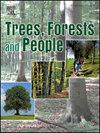美国东南部动物采伐的特征
IF 2.7
Q1 FORESTRY
引用次数: 0
摘要
由于家庭森林面积小与机械化采伐公司对面积的要求越来越不一致,美国东南部大多数家庭森林土地所有者基本上无法进行传统的森林管理。与传统的机械化采伐相比,动物采伐的成本和生态影响相对较小,是填补小块森林生态管理生态位的理想选择。然而,人们对这种做法在美国东南部的现状知之甚少。我们调查了东南部8个州的动物采伐的流行程度,并通过调查阐明了其从业人员的人口统计学和业务特征,评估了当前动物采伐网络满足森林管理需求的能力。调查结果表明,这种做法有潜力作为小块森林管理的一种选择,但目前的机会受到该地区役畜伐木工人数量少的限制。本文章由计算机程序翻译,如有差异,请以英文原文为准。
Characterizing draft animal logging operations in the southeastern United States
Conventional forest management has become largely inaccessible for most family forest landowners in the southeastern United States because of growing incongruencies between the small tract sizes of family forests and the tract size requirements of mechanized logging firms. Compared to conventional mechanized logging, draft animal logging has relatively minimal costs and ecological impacts, making it an appealing candidate to fill the small-parcel ecological forest management niche. However, little is known about the current status of the practice in the southeastern US. We investigated the prevalence of draft animal logging in eight Southeastern states and elucidated demographic and operational characteristics of its practitioners with a survey, evaluating the ability of the current network of draft animal loggers to meet forest management needs. Findings indicate that the practice has potential as a small-parcel forest management option, but current opportunities are limited by the small number of draft animal loggers operating in the region.
求助全文
通过发布文献求助,成功后即可免费获取论文全文。
去求助
来源期刊

Trees, Forests and People
Economics, Econometrics and Finance-Economics, Econometrics and Finance (miscellaneous)
CiteScore
4.30
自引率
7.40%
发文量
172
审稿时长
56 days
 求助内容:
求助内容: 应助结果提醒方式:
应助结果提醒方式:


